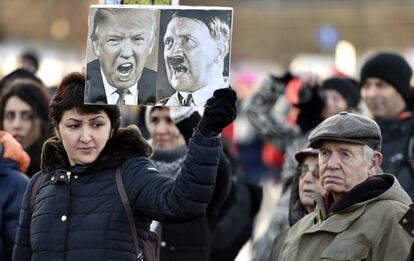The Problem with Hate Speech Laws in Europe

Europe is driven by a dream. It wants to eradicate hate, a strong emotion of dislike that every human being has felt from time to time. The European Union and its institutions seem to believe that if it can create a public space free of hate and offense it will achieve eternal peace. To me that sounds utopian and we know from history that the first victim of any utopia is freedom. In this case freedom of expression. The right to hate is as important as the right to love as long as it isn’t expressed as a direct incitement to violence.
It’s difficult to dispute the legitimacy of hate experienced by parents whose child has been molested by a pedophile. The same goes for victims of a crime or of people who have been let down in one way or the other. Hate is part of being human whether we like it or not. This doesn’t mean that we shouldn’t speak out against hate targeting minorities. Of course, we should, but the law is not an effective tool to fight opinions driving hateful speech. To do that we need more speech, not less.
European hate speech laws are legitimized by the UN covenant on Civil and Political Rights that was adopted in 1966. Few though know that liberal democracies like Sweden, Norway, the Netherlands and the UK voted against the covenant’s article calling for criminalizing incitement to hatred. The article was initiated by the Soviet bloc. Eleanor Roosevelt who chaired the UN Human Rights Committee warned that it could be used by any dictator to silence criticism. That is exactly what happenend. Though hate speech laws are being justified as a way of protecting minorities the have been used to undermine the rights of ethnic and religious minorities as well as movements for social change all around the world. If the Dutch politician Geert Wilders one day gets a majority in parliament he may use existing hate speech laws to ban the Koran and discriminate Muslims.
One man’s hate speech is another man’s poetry
Usually, hate speech laws serve as a tool to enforce one group’s social norms on society as a whole. That is especially problematic in an increasingly diverse Europe, where people adhere to different beliefs.
One man’s hate speech is another man’s poetry. What is sacred to a Christian, may sound like blasphemy to a Muslim.
In 2007 the EU adapted a frame work decision that obligated member states to pass laws criminalizing denial of the Holocaust and other kinds of hateful speech denigrating or mocking individuals or groups. Today these laws are on the books in 13 of the 28 member states. In Eastern Europe this initiative has led to proliferation of laws criminalizing denying or minimizing the crimes of Communism. Russia, Ukraine, Rwanda and Bangladesh have used the European Union’s Holocaust denial laws to justify attacks on free speech and on academic freedom.
A key problem with hate speech laws is that there doesn’t excist a clear definition of hateful speech. This creates room for the powers that be to use the law to clamp down on opinions and speech that they don’t like. In 2015 the EU-commissioner for legal affairs Vera Jourova said:
"If freedom of expression is one of the building blocks of a democratic society, hate speech on the other hand is a blatant violation of that freedom. It must be severely punished."
This is a dangerous approach to free speech, especially if there isn’t any consensus on the concept of hate speech. In fact, the right to offend is part and parcel of freedom of expression. No one has a right not to be offended. Free speech only means something if it includes the right to tell people what they don’t like – as George Orwell once put it.
At the heart of the debate about hate speech and the limits of free speech in Europe lies a paradox: European politicians have welcomed and celebrated cultural, religious and ethnic diversity. At the same time they haven’t been willing to accept the same kind of diversity when it comes to speech. They insist that the more diversity of culture and religion the less diversity of speech we need. To me that’s illogical. If we welcome cultural and religious diversity we have to accept that this implies a need for more freedom of speech in order to express our differences and disagreements, not less.
Flemming Rose is a senior fellow at Cato Institute in Washington DC and author of La Tiranía Del Silencio (Spanish translation 2016)